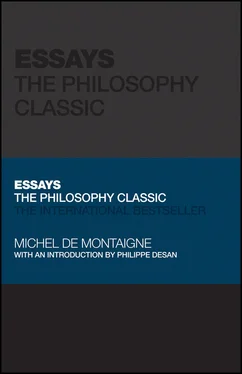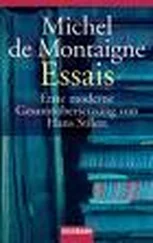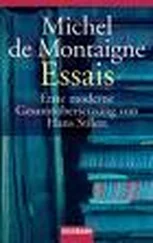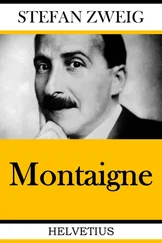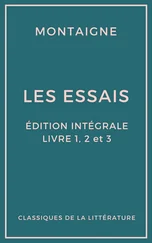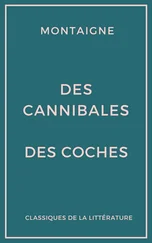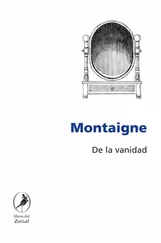Michel de Montaigne - Essays
Здесь есть возможность читать онлайн «Michel de Montaigne - Essays» — ознакомительный отрывок электронной книги совершенно бесплатно, а после прочтения отрывка купить полную версию. В некоторых случаях можно слушать аудио, скачать через торрент в формате fb2 и присутствует краткое содержание. Жанр: unrecognised, на английском языке. Описание произведения, (предисловие) а так же отзывы посетителей доступны на портале библиотеки ЛибКат.
- Название:Essays
- Автор:
- Жанр:
- Год:неизвестен
- ISBN:нет данных
- Рейтинг книги:3 / 5. Голосов: 1
-
Избранное:Добавить в избранное
- Отзывы:
-
Ваша оценка:
- 60
- 1
- 2
- 3
- 4
- 5
Essays: краткое содержание, описание и аннотация
Предлагаем к чтению аннотацию, описание, краткое содержание или предисловие (зависит от того, что написал сам автор книги «Essays»). Если вы не нашли необходимую информацию о книге — напишите в комментариях, мы постараемся отыскать её.
Essays: The Philosophy Classic
Essays: The Philosophy Classic
Essays — читать онлайн ознакомительный отрывок
Ниже представлен текст книги, разбитый по страницам. Система сохранения места последней прочитанной страницы, позволяет с удобством читать онлайн бесплатно книгу «Essays», без необходимости каждый раз заново искать на чём Вы остановились. Поставьте закладку, и сможете в любой момент перейти на страницу, на которой закончили чтение.
Интервал:
Закладка:
The confidence in another man's virtue is no light evidence of a man's own, and God willingly favours such a confidence. As to what concerns him of whom I am speaking, I see nowhere a better governed house, more nobly and constantly maintained than his. Happy to have regulated his affairs to so just a proportion that his estate is sufficient to do it without his care or trouble, and without any hindrance, either in the spending or laying it up, to his other more quiet employments, and more suitable both to his place and liking.
Plenty, then, and indigence depend upon the opinion everyone has of them; and riches no more than glory or health have other beauty or pleasure than he lends them by whom they are possessed.
Everyone is well or ill at ease, according as he so finds himself; not he whom the world believes, but he who believes himself to be so, is content; and in this alone belief gives itself being and reality. Fortune does us neither good nor hurt; she only presents us the matter and the seed, which our soul, more powerful than she, turns and applies as she best pleases; the sole cause and sovereign mistress of her own happy or unhappy condition. All external accessions receive taste and colour from the internal constitution, as clothes warm us, not with their heat, but our own, which they are fit to cover and nourish; he who would shield therewith a cold body, would do the same service for the cold, for so snow and ice are preserved. And, certes, after the same manner that study is a torment to an idle man, abstinence from wine to a drunkard, frugality to the spendthrift, and exercise to a lazy, tender-bred fellow, so it is of all the rest. The things are not so painful and difficult of themselves, but our weakness or cowardice makes them so. To judge of great, and high matters requires a suitable soul; otherwise we attribute the vice to them which is really our own. A straight oar seems crooked in the water it does not only import that we see the thing, but how and after what manner we see it.
After all this, why, amongst so many discourses that by so many arguments persuade men to despise death and to endure pain, can we not find out one that helps us? And of so many sorts of imaginations as have so prevailed upon others as to persuade them to do so, why does not everyone apply someone to himself, the most suitable to his own humour? If he cannot digest a strong-working decoction to eradicate the evil, let him at least take a lenitive to ease it:
It is an effeminate and flimsy opinion, nor more so in pain than in pleasure, in which, while we are at our ease, we cannot bear without a cry the sting of a bee. The whole business is to commend thyself.
—Cicero, Tusculum Disputations , ii. 22.
As to the rest, a man does not transgress philosophy by permitting the acrimony of pains and human frailty to prevail so much above measure; for they constrain her to go back to her unanswerable replies: “If it be ill to live in necessity, at least there is no necessity upon a man to live in necessity”: “No man continues ill long but by his own fault.” He who has neither the courage to die nor the heart to live, who will neither resist nor fly, what can we do with him?
20 TO STUDY PHILOSOPHY IS TO LEARN HOW TO DIE
Cicero says “that to study philosophy is nothing but to prepare one's self to die.” The reason of which is, because study and contemplation do in some sort withdraw from us our soul, and employ it separately from the body, which is a kind of apprenticeship and a resemblance of death; or, else, because all the wisdom and reasoning in the world do in the end conclude in this point, to teach us not to fear to die. And to say the truth, either our reason mocks us, or it ought to have no other aim but our contentment only, nor to endeavour anything but, in sum, to make us live well, and, as the Holy Scripture says, at our ease. All the opinions of the world agree in this, that pleasure is our end, though we make use of divers means to attain it: they would, otherwise, be rejected at the first motion; for who would give ear to him that should propose affliction and misery for his end? The controversies and disputes of the philosophical sects upon this point are merely verbal:
Transcurramus solertissimas nugas.
[Let us skip over those subtle trifles.
—Seneca, Epistles , 117.]
—there is more in them of opposition and obstinacy than is consistent with so sacred a profession; but whatsoever personage a man takes upon himself to perform, he ever mixes his own part with it.
Let the philosophers say what they will, the thing at which we all aim, even in virtue is pleasure. It amuses me to rattle in ears this word, which they so nauseate to and if it signify some supreme pleasure and contentment, it is more due to the assistance of virtue than to any other assistance whatever. This pleasure, for being more gay, more sinewy, more robust and more manly, is only the more seriously voluptuous, and we ought give it the name of pleasure, as that which is more favourable, gentle, and natural, and not that from which we have denominated it. The other and meaner pleasure, if it could deserve this fair name, it ought to be by way of competition, and not of privilege. I find it less exempt from traverses and inconveniences than virtue itself; and, besides that the enjoyment is more momentary, fluid, and frail, it has its watchings, fasts, and labours, its sweat and its blood; and, moreover, has particular to itself so many several sorts of sharp and wounding passions, and so dull a satiety attending it, as equal it to the severest penance. And we mistake if we think that these incommodities serve it for a spur and a seasoning to its sweetness (as in nature one contrary is quickened by another), or say, when we come to virtue, that like consequences and difficulties overwhelm and render it austere and inaccessible; whereas, much more aptly than in voluptuousness, they ennoble, sharpen, and heighten the perfect and divine pleasure they procure us. He renders himself unworthy of it who will counterpoise its cost with its fruit, and neither understands the blessing nor how to use it. Those who preach to us that the quest of it is craggy, difficult, and painful, but its fruition pleasant, what do they mean by that but to tell us that it is always unpleasing? For what human means will ever attain its enjoyment? The most perfect have been fain to content themselves to aspire unto it, and to approach it only, without ever possessing it. But they are deceived, seeing that of all the pleasures we know, the very pursuit is pleasant. The attempt ever relishes of the quality of the thing to which it is directed, for it is a good part of, and consubstantial with, the effect. The felicity and beatitude that glitters in Virtue, shines throughout all her appurtenances and avenues, even to the first entry and utmost limits.
Now, of all the benefits that virtue confers upon us, the contempt of death is one of the greatest, as the means that accommodates human life with a soft and easy tranquillity, and gives us a pure and pleasant taste of living, without which all other pleasure would be extinct. Which is the reason why all the rules centre and concur in this one article. And although they all in like manner, with common accord, teach us also to despise pain, poverty, and the other accidents to which human life is subject, it is not, nevertheless, with the same solicitude, as well by reason these accidents are not of so great necessity, the greater part of mankind passing over their whole lives without ever knowing what poverty is, and some without sorrow or sickness, as Xenophilus the musician, who lived a hundred and six years in a perfect and continual health; as also because, at the worst, death can, whenever we please, cut short and put an end to all other inconveniences. But as to death, it is inevitable:
Читать дальшеИнтервал:
Закладка:
Похожие книги на «Essays»
Представляем Вашему вниманию похожие книги на «Essays» списком для выбора. Мы отобрали схожую по названию и смыслу литературу в надежде предоставить читателям больше вариантов отыскать новые, интересные, ещё непрочитанные произведения.
Обсуждение, отзывы о книге «Essays» и просто собственные мнения читателей. Оставьте ваши комментарии, напишите, что Вы думаете о произведении, его смысле или главных героях. Укажите что конкретно понравилось, а что нет, и почему Вы так считаете.
